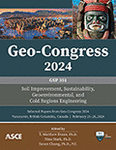Optimum Fly Ash Content to Improve the Geotechnical Properties of Expansive Soil
Publication: Geo-Congress 2024
ABSTRACT
Expansive soils pose a serious challenge to civil engineering constructions due to their ability to swell and shrink upon wetting and drying. This phenomenon usually leads to damage of the structure when the soil is not treated properly. Moreover, the disposal and utilization of fly ash (FA) in both economical and eco-friendly ways has received high attention in the world. Thus, this study focuses on the improvement of the geotechnical properties of expansive soils stabilized with varying percentages of fly ash as an admixture. In the present study, low calcium fly ash in different proportions by weight (0%, 10%, 20%, 30%, and 40%) was added to a moderately expansive soil collected from Doharramafi Village, India. Laboratory tests performed on the prepared mixtures included the determination of moisture-density relationships, California bearing ratio (CBR), and shear strength parameters. Test results show that moisture-density relationships, CBR values, and shear strength parameters of fly ash-treated soil are significantly modified and improved compared to control specimens. Furthermore, based on all laboratory tests, 30% fly ash content is observed to be the optimum fly ash quantity required to improve the geotechnical properties of soil stabilized with fly ash.
Get full access to this article
View all available purchase options and get full access to this chapter.
REFERENCES
ASTM. (2017). Standard Practice for Classification of Soils for Engineering Purposes (Unified Soil Classification System), Standard ASTM D2487-17. ASTM International, West Conshohocken, PA, USA.
ASTM. (2017). Standard Test Methods for Liquid limit, Plastic limit, and Plasticity Index of Soils, Standard ASTM D4318-17. ASTM International, West Conshohocken, PA, USA.
ASTM. (2021). Standard Test Method for California Bearing Ratio (CBR) of Laboratory-Compacted Soils, Standard ASTM D1883-21. ASTM International, West Conshohocken, PA, USA.
ASTM. (2021). Standard Test Methods for Laboratory Compaction Characteristics of Soil Using Standard Effort (12,400 ft-lbf/ft3 (600 kN-m/m3)), Standard ASTM D698-12. ASTM International, West Conshohocken, PA, USA.
ASTM. (2022). Standard Specifications for Coal Fly Ash and Raw or Calcined natural Pozzolan for Use in Concrete, Standard ASTM C618-22. ASTM International, West Conshohocken, PA, USA.
ASTM. (2023). Standard Test Method for Unconsolidated-Undrained Triaxial Compression Test on Cohesive Soils, Standard ASTM D2850-23. ASTM International, West Conshohocken, PA, USA.
Basha, E. A., Hashim, R., Mahmud, H. B., and Muntohar, A. S. (2005). “Stabilization of residual soil with rice husk ash and cement.” Construction and building materials, 19(6), 448–453.
Bose, B. (2012). “Geo engineering properties of expansive soil stabilized with fly ash.” Electronic Journal of Geotechnical Engineering, 17(1), 1339–1353.
Cokca, E. (2001). “Use of Class C Fly Ashes for the Stabilization of an Expansive Soil.” Journal of Geotechnical and Geoenvironmental Engineering, 127(7), 568–573.
Deb, T., and Pal, S. K. (2014). “Effect of fly ash on geotechnical properties of local soil-fly ash mixed samples.” International Journal of Research in Engineering and Technology, 3(5), 507–516.
Kumar, P. G., and Harika, S. (2021). “Stabilization of expansive subgrade soil by using fly ash.” Materials Today: Proceedings, 45, 6558–6562.
Mahedi, M., and Cetin, B. (2019). “Leaching of elements from cement activated fly ash and slag amended soils.” Chemosphere, 235, 565–574.
Mahedi, M., Cetin, B., and White, D. J. (2018). “Performance evaluation of cement and slag stabilized expansive soils.” Transportation Research Record, 2672(52), 164–173.
Mir, B. A., and Sridharan, A. (2013). “Physical and Compaction Behaviour of Clay Soil–Fly Ash Mixtures.” Geotechnical and Geological engineering, 31, 1059–1072.
Mokhtari, M., and Dehghani, M. (2012). “Swell-shrink behavior of expansive soils, damage and control.” Electronic Journal of Geotechnical Engineering, 17, 2673–2682.
Pandian, N. S., Krishna, K. C., and Sridharan, A. (2001). “California bearing ratio behavior of soil/fly ash mixtures.” Journal of Testing and Evaluation, 29(2), 220–226.
Pavan, S., and Rao, S. K. (2014). “Effect of Fly Ash on Strength Characteristics of Roller Compacted Concrete Pavement.” IOSR J. Mech. Civ. Eng., 11 (6), 4–8.
Phanikumar, B. R., and Nagaraju, T. V. (2018). “Effect of Fly Ash and Rice Husk Ash on Index and Engineering Properties of Expansive Clays. Geotech. Geol. Eng., 36(6), 3425–3436.
Prabakar, J., Dendorkar, N., and Morchhale, R. K. (2004). “Influence of fly ash on strength behavior of typical soils.” Construction and Building Materials, 18(4), 263–267.
Puppala, A. J., Chittoori, B., and Raavi, A. (2015). “Flowability and density characteristics of controlled low-strength material using native high-plasticity clay.” Journal of Materials in Civil Engineering, 27(1), 06014026.
Seyrek, E. (2016). “Engineering behavior of clay soils stabilized with class C and class F fly ashes.” Sci. Eng. Compos. Mater. 25(2), 273–287.
Sharma, N. K., Swain, S. K., and Sahoo, U. C. (2012). “Stabilization of a Clayey Soil with Fly Ash and Lime: A Micro Level Investigation.” Geotech. Geol. Eng., 30, 1197–1205.
Shrivastava, A., Saxena, A., and Sachan, A. (2022). “Effect of guar gum biopolymer on shear strength and liquefaction response of coal ash.” In proceedings of Indian Geotechnical Conference, IGC 2022, TH-2-34.
Thomas, M. D. A. (2007). Optimizing the use of fly ash in concrete. Portland Cement Association, 24.
White, D. J., Harrington, D., Ceylan, H., and Rupnow, T. (2005). “Fly Ash Soil Stabilization for Non-Uniform Subgrade Soils, Volume I: Engineering Properties and Construction Guidelines.”.
Yilmaz, Y. (2015). “Compaction and strength characteristics of fly ash and fiber amended clayey soil.” Engineering Geology, 188, 168–177.
Information & Authors
Information
Published In
History
Published online: Feb 22, 2024
ASCE Technical Topics:
- Ashes
- Construction engineering
- Engineering materials (by type)
- Expansive soils
- Fine-grained soils
- Fly ash
- Geomechanics
- Geotechnical engineering
- Geotechnical investigation
- Material mechanics
- Material properties
- Materials engineering
- Penetration tests
- Shear strength
- Soil dynamics
- Soil mechanics
- Soil properties
- Soil stabilization
- Soils (by type)
- Strength of materials
Authors
Metrics & Citations
Metrics
Citations
Download citation
If you have the appropriate software installed, you can download article citation data to the citation manager of your choice. Simply select your manager software from the list below and click Download.
